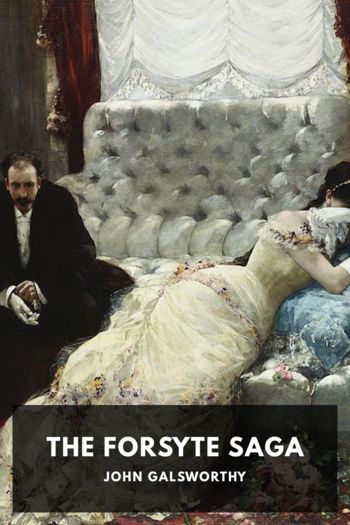The Forsyte Saga - John Galsworthy (best english novels for beginners .txt) 📗

- Author: John Galsworthy
Book online «The Forsyte Saga - John Galsworthy (best english novels for beginners .txt) 📗». Author John Galsworthy
There were other reasons, too, for this mild reproduction. A distrust of their earning powers, natural where a sufficiency is guaranteed, together with the knowledge that their fathers did not die, kept them cautious. If one had children and not much income, the standard of taste and comfort must of necessity go down; what was enough for two was not enough for four, and so on—it would be better to wait and see what Father did. Besides, it was nice to be able to take holidays unhampered. Sooner in fact than own children, they preferred to concentrate on the ownership of themselves, conforming to the growing tendency—fin de siècle, as it was called. In this way, little risk was run, and one would be able to have a motorcar. Indeed, Eustace already had one, but it had shaken him horribly, and broken one of his eye teeth; so that it would be better to wait till they were a little safer. In the meantime, no more children! Even young Nicholas was drawing in his horns, and had made no addition to his six for quite three years.
The corporate decay, however, of the Forsytes, their dispersion rather, of which all this was symptomatic, had not advanced so far as to prevent a rally when Roger Forsyte died in 1899. It had been a glorious summer, and after holidays abroad and at the sea they were practically all back in London, when Roger with a touch of his old originality had suddenly breathed his last at his own house in Princes Gardens. At Timothy’s it was whispered sadly that poor Roger had always been eccentric about his digestion—had he not, for instance, preferred German mutton to all the other brands?
Be that as it may, his funeral at Highgate had been perfect, and coming away from it Soames Forsyte made almost mechanically for his Uncle Timothy’s in the Bayswater Road. The “Old Things”—Aunt Juley and Aunt Hester—would like to hear about it. His father—James—at eighty-eight had not felt up to the fatigue of the funeral; and Timothy himself, of course, had not gone; so that Nicholas had been the only brother present. Still, there had been a fair gathering; and it would cheer Aunts Juley and Hester up to know. The kindly thought was not unmixed with the inevitable longing to get something out of everything you do, which is the chief characteristic of Forsytes, and indeed of the saner elements in every nation. In this practice of taking family matters to Timothy’s in the Bayswater Road, Soames was but following in the footsteps of his father, who had been in the habit of going at least once a week to see his sisters at Timothy’s, and had only given it up when he lost his nerve at eighty-six, and could not go out without Emily. To go with Emily was of no use, for who could really talk to anyone in the presence of his own wife? Like James in the old days, Soames found time to go there nearly every Sunday, and sit in the little drawing-room into which, with his undoubted taste, he had introduced a good deal of change and china not quite up to his own fastidious mark, and at least two rather doubtful Barbizon pictures, at Christmastides. He himself, who had done extremely well with the Barbizons, had for some years past moved towards the Marises, Israels, and Mauve, and was hoping to do better. In the riverside house which he now inhabited near Mapledurham he had a gallery, beautifully hung and lighted, to which few London dealers were strangers. It served, too, as a Sunday afternoon attraction in those weekend parties which his sisters, Winifred or Rachel, occasionally organised for him. For though he was but a taciturn showman, his quiet collected determinism seldom failed to influence his guests, who knew that his reputation was grounded not on mere aesthetic fancy, but on his power of gauging the future of market values. When he went to Timothy’s he almost always had some little tale of triumph over a dealer to unfold, and dearly he loved that coo of pride with which his aunts would greet it. This afternoon, however, he was differently animated, coming from Roger’s funeral in his neat dark clothes—not quite black, for after all an uncle was but an uncle, and his soul abhorred excessive display of feeling. Leaning back in a marqueterie chair and gazing down his uplifted nose at the sky-blue walls plastered with gold frames, he was noticeably silent. Whether because he had been to a funeral or not, the peculiar Forsyte build of his face was seen to the best advantage this afternoon—a face concave and long, with a jaw which divested of flesh would have seemed extravagant: altogether a chinny face though not at all ill-looking. He was feeling more strongly than ever that Timothy’s was hopelessly “rum-ti-too” and the souls of his aunts dismally mid-Victorian. The subject on which alone he wanted to talk—his own undivorced position—was unspeakable. And yet it occupied his mind to the exclusion of all else. It was only since the Spring that this had been so and a new feeling grown up which was egging him on towards what he knew might well be folly in a Forsyte of forty-five. More and more of late he had been conscious that he was “getting on.” The fortune already considerable when he conceived the house at Robin Hill which had finally wrecked his marriage with Irene, had mounted with surprising vigour in the twelve lonely years during which he had devoted himself to little else. He was worth today well over a hundred thousand pounds, and had no one to leave it to—no real object for going on with what was his religion. Even if he





Comments (0)